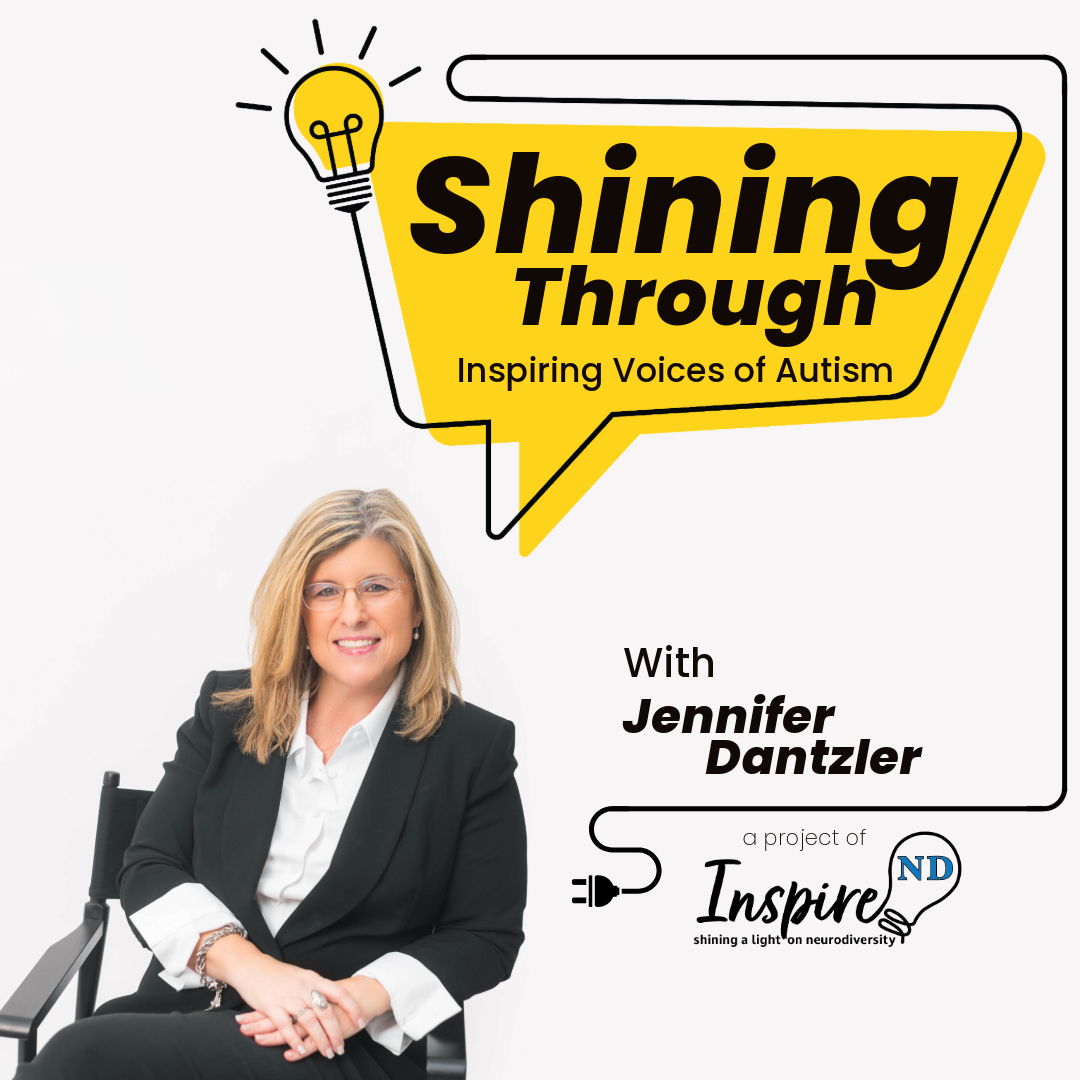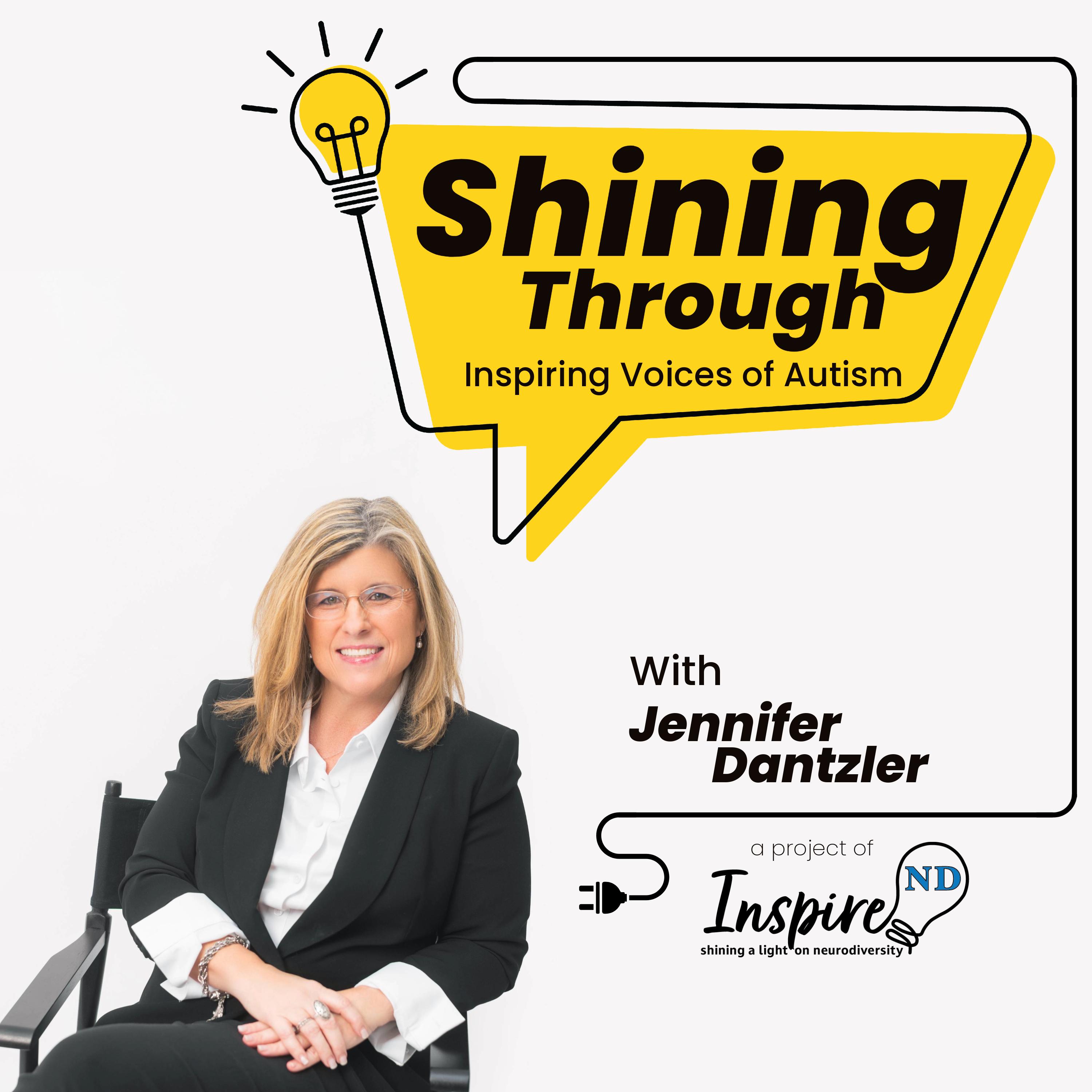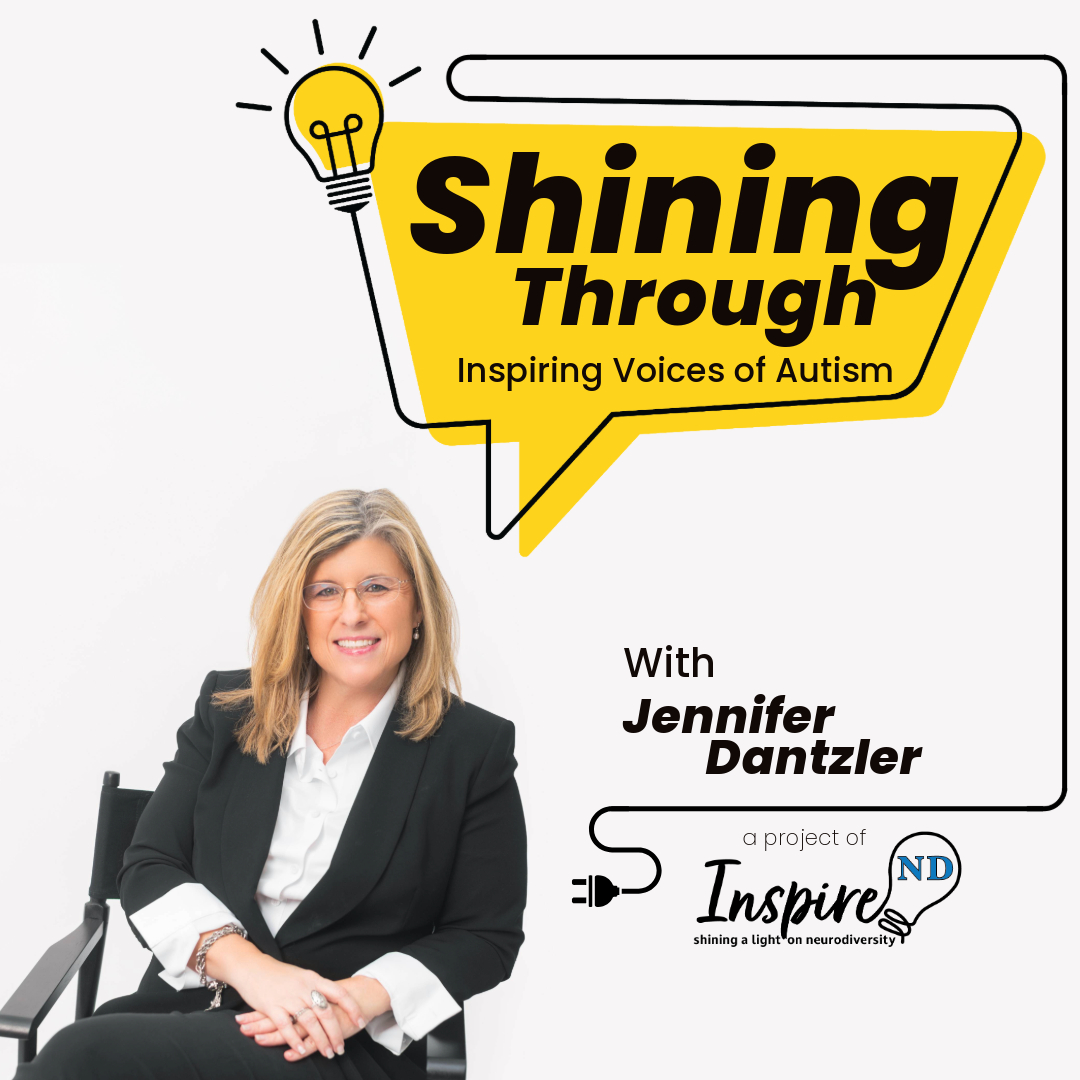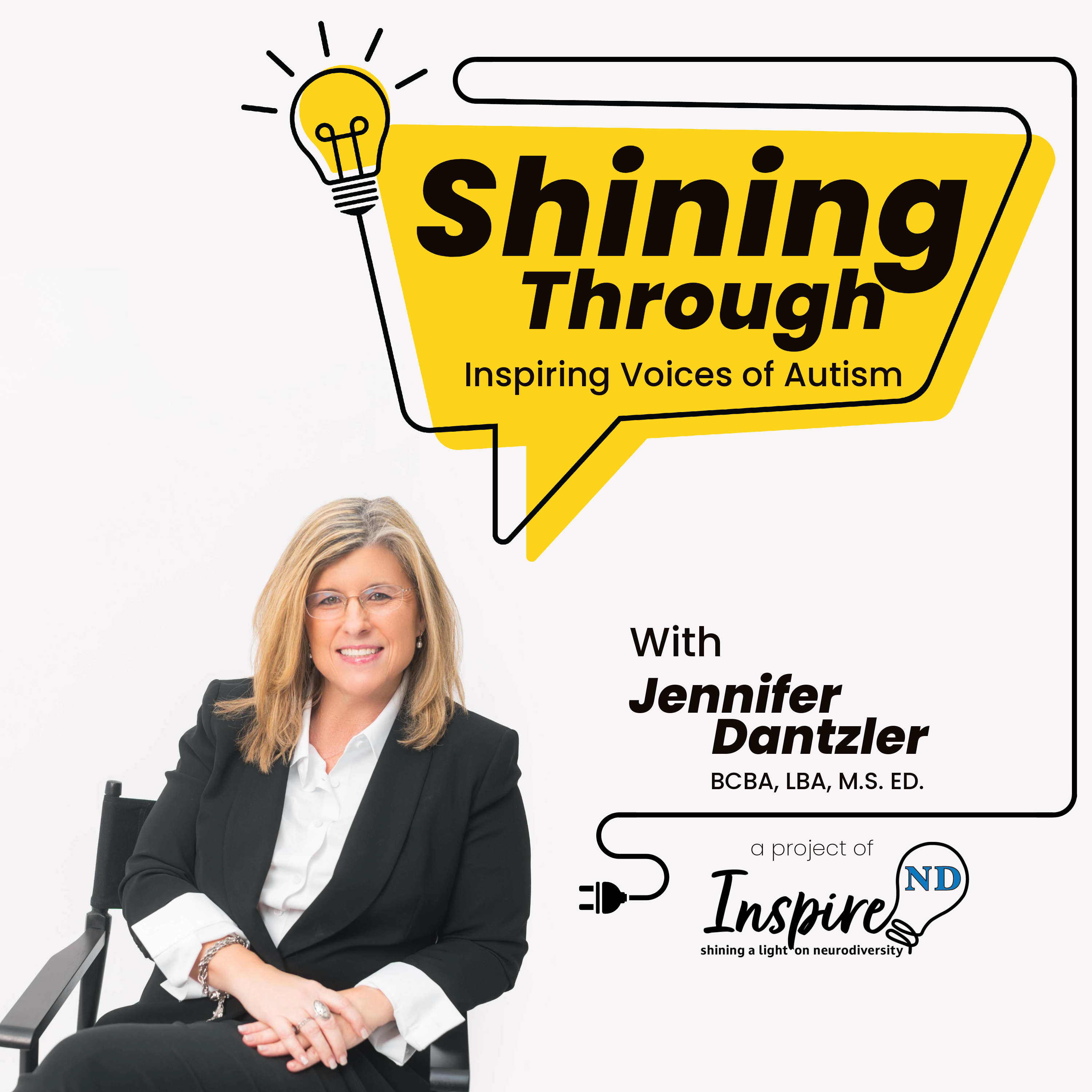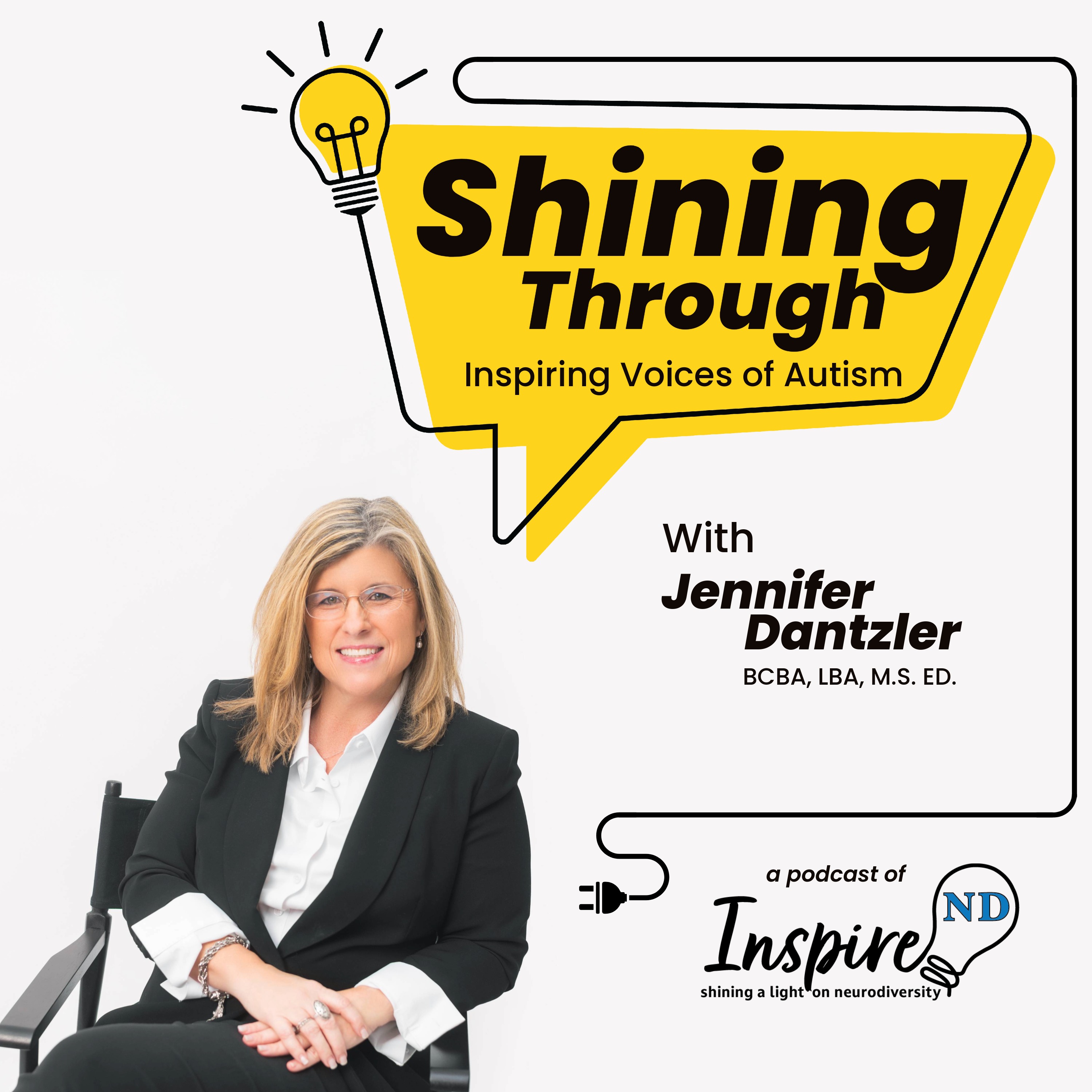[00:00:01] Speaker A: Welcome to Shining Through Inspire Voices of Autism with show host Jennifer Dantzler. My name is Veronica and I have Williams syndrome. Thank you for taking the time to learn more about the world of autism. If you enjoy what you hear today, don't forget to subscribe to this podcast.
[00:00:19] Speaker B: Hey there, everyone. This is Jennifer Dantzler, and I'm the executive director and founder of Inspire ND and nonprofit whose mission is to create truly inclusive communities through education and engagement. The goal of this podcast is to shine a light on real people and their stories in hopes of inspiring others who are on this journey of autism. Either themselves, their child, their loved one, their coworker. I truly believe ignorance is not bliss, and we cannot be inclusive communities if we do not understand the people in the community. With autism now affecting 1 in 36 people, we need to get louder about this topic, and that's our goal during this podcast. Podcast, we recognize that autism is a spectrum. There are a lot of people with a lot of different needs, a lot of resources available or none available. And we know that in every episode we can't meet everyone's needs for their specific interest. However, we hope that in each episode you do gleam some kind of insight as to how you can help your child or yourself be a better advocate. And as we go through our podcasts, our goal really is to address the entire spectrum, the various needs, the various environments that we're going to be in. And we hope that there's something in every episode for each one of you. So let's get started.
Hey, everyone. We are here today with a special guest. Today's going to be a little bit different because the guest has a son who has high functioning autism, and when mom talked to him about doing this, he asked that he remain anonymous. So we're going to talk a little bit about that during the podcast. So I know it's a little different, but today, for the sake of ease, we're going to call mom Sarah and we're going to call the son Ben. So, full disclosure, that's not their real names, but part of what we want to do in this podcast is really respect each and every individual who's on the Spectrum or Neurodiverse, and really help them shine a light in the way they want to shine the light. And we don't feel like it's our right to go against that. So thank you so much for being here. Sarah, tell us a little bit about your son, how old he is, and a little bit about his journey getting diagnosed.
[00:02:35] Speaker C: Ben is now 20 and has been a long road. These questions have taken me back quite a bit because part of you kind of forgets how far along they've come when they get this far. He is now 20. He's obtaining his associate's degree in computers at a state school here in Texas and doing amazing. He's not only taking the classes, passing the classes. He's also living in a dorm, navigating, living in a dorm with roommates, doing his own laundry. So if you're a mother of a son, you know, that's a big task. Shopping for his own snacks and groceries, washing his sheets, you know, doing all the things.
[00:03:16] Speaker B: Doing all the things that college kids do.
[00:03:18] Speaker C: Correct.
[00:03:18] Speaker B: Awesome. Awesome.
[00:03:19] Speaker C: Awesome.
[00:03:19] Speaker B: How old was he when he was diagnosed?
[00:03:22] Speaker C: He's between two and three. The journey began at two. The same. Typical story. You hear he was progressing, and then he stopped talking, and he just changed. And I started asking lots of questions. So it took about a year.
[00:03:37] Speaker B: And what was the early part of that journey? What did you do as far as services and how did you help him?
[00:03:43] Speaker C: It was hard. It was a lot. I started with the pediatrician. He said he's just a typical boy. He's just active. I had an older son at the time, so I knew that wasn't your typical progress speech. Speech was a big one because without speech, you've got a lot of behavior. So speech opened the door, referred us on to an ent. We got tubes.
We also, at the same time we're seeing, started aba. We also started diet. We did some supplements. We did listening therapy. If you name it, we did it. As long as I felt like it was safe for him, okay.
[00:04:18] Speaker B: And that's, I think, so important because I think parents struggle with how to get started and where to get started, and then they don't get started.
[00:04:26] Speaker C: Correct.
[00:04:27] Speaker B: Right. So for you, it was just, let's just jump in two feet and let's figure out what we're going to do as we go. Did you ever start a service or therapy and then stop it for some reason?
[00:04:38] Speaker C: None that I can think of. Some phased out over time, just naturally, but no.
[00:04:45] Speaker B: How did you make a decision as to which therapy? Was it a mommy gut? Was it because of some article you read or some commercial you saw on tv? Like, how did you know what to do?
[00:04:55] Speaker C: I started with speech because I feel like communication is number one and that's what he was lacking in. I felt like communication could help open some doors to some of the behaviors he was having. Running, jumping. We couldn't go anywhere without a Fence. He was like a boy on fire. Then I just started reading. So this is, you know, 17 years ago. So the Internet was out there, but it wasn't as much as we have nowadays. So I started reading about aba and to me, ABA was life changing for us. So the speech, the aba, we started seeing a doctor. She recommended some supplements. She recommended changing his diet, which of course was a good idea because all he ate was like crackers and milk.
[00:05:32] Speaker B: And so you started doing all those therapies. And I would say now as you look back and he's doing as well as he, I think could possibly be doing. What's a lesson you learned that you wish a parent of a newly diagnosed child could benefit from?
[00:05:47] Speaker C: Trust your mommy Gut. Limit the iPad time.
[00:05:50] Speaker B: And I'm just going to jump in there. And this is, I think for all children, neurotypical and those on the spectrum. And I'm don't take my own advice. But yes, that should happen.
[00:05:59] Speaker C: Yes, yes. Because he's naturally drawn to it and so limiting his appetite time. I wish I'd pushed his diet a little more. And I mean I would also say to you moms who are out here, I see you. It is such a lonely, tough time in life. I was in survival mode. But I wish I had pushed a wider variety of diet at the time. At those days I was just trying to get by.
[00:06:22] Speaker B: And I think that's so important because at the time you're trying to maybe avoid inappropriate behavior, you're trying to make sure he gets some kind of nourishment. So when and how do you switch from survival mode to proactive mode to where? Now fast forward. He's in college and still somewhat has a limited food repertoire.
[00:06:41] Speaker C: Correct. I look back and wish I had pushed more. I would have used my ABA therapist more to help us expand his diet if then was a good one. They taught us if you do this, then you do this. That worked with a lot of behaviors. His behaviors were so bad. The diet to me was low on the totem pole. But it's a lifelong thing. 20 year old boy in an average way. He wants pizza and burgers and fries, which is not healthy. But he. Yeah, he lives on the fast food diet.
[00:07:08] Speaker B: Yes. As many of us.
[00:07:09] Speaker D: He has a carb.
[00:07:10] Speaker C: He loves it.
[00:07:10] Speaker B: That's right. As many of us do. Okay, so I am going to have to pause here for a minute and ask some more details. Being that I am a board certified behavior analyst, I would like to talk a little bit more about his time in ABA and Let's talk a little bit more about some. Some of the skills that they worked on and how you've seen those skills be really important for him as he becomes an adult.
[00:07:32] Speaker C: The skills he learned in Aba were life changing for us just in how our family functioned. Because before then, whatever Ben wanted, he got because we were trying to avoid behaviors and tantrums or whatever else would happen. And so Aba taught us how to break down the behavior and expect, you know, expect whatever it was, and then you get your reward or however you break it down. It taught us how to work with him, and it just changed how our family functioned. I can remember him getting in the car one day, and Ben wanted to sit in the left seat, and brother was in the left seat. And I said, hey, brother, will you move over to the other seat? And the ABA therapist said, no, don't make brother move. Make Ben move, because that's how life is. That stuck with me, because it was like, you can't run around paving the way for your child. You have to teach your child to be able to function in society. And Aba just worked with Ben, it just worked. He was all about the rewards. And for him, it wasn't even the food. It was the riding the tricycle, doing on the swing. He had that sensory room in the middle. He lived for the sensory room because that's how that's what he needed. And so Aba, looking back, I mean, that was probably the best ABA and speech, but ABA was one of the best interventions we did well.
[00:08:52] Speaker B: And I appreciate you saying that, because a lot of the skills are what we call shaping of behavior. And I do see parents that will end up backing themselves into a corner, right? Whether it's having to drive home the exact same way every day, stopping at McDonald's on Tuesdays faithfully. But what's not taken into account is, oh, there's construction on that road, and then what do we do? And now that child in the car, it's painful. It's hard for the child. So while some might say, brother should have just moved over, but to your point, that's not life. And if you do it the right way and teach the right way and use that reinforcement system, I will also make a note to say that there are people out there who talk about Aba, and it's about this extrinsic motivation. But at this point, Ben has moved to a lot of intrinsic motivation, and he doesn't. Isn't using those rewards now, but he needed that incentive early on. And the analogy, I always like to make is do you go to work and get a paycheck? Well, that's your extrinsic motivation. So we all. We set ourselves up. And I think there are a lot of people who misunderstand. Well, I know there are a lot of people who misunderstand ABA and what it is. It's kind. It can be hard, right toe in the line, be consistent, especially as a parent, because it would have just been easier for brother to move over.
[00:10:08] Speaker C: It would have. But, I mean, where we are was already hard. So I remember that day stuck with me because I thought, wow. And, you know, I look at my other sweet child who's just been used to just doing what I asked to keep. To keep the peace, and I can close my eyes and see his little smiling face, like, I got my way, you know, for once. And that it also inspired me to be like, all right, we're going to make some changes. And again, I don't know all the behind the scenes of aba, but I just know it changed him.
[00:10:38] Speaker B: What is a victory, an unexpected victory that you had along the way?
[00:10:43] Speaker C: If you told me back then that he would be getting his associate's degree in computers, I would never have believed you. When we were first starting. It's just a wonderful gift.
[00:10:53] Speaker B: So I know you had mentioned you dropped him off at college and you had showed him where the Disability services department was. And what was his reaction to that?
[00:11:01] Speaker C: We went by and we printed off his papers from East Bed. And I said, here is. This is going to be different than high school. They do not have to help you. If you need help, you have to seek it out from them. This is the office. Here's your paperwork. And he said, I would like to try it on my own. And I said, okay, but if you need help, they are here to help you. So far, we're almost at the end of two years, and he has done really well. The autism still comes into effect, but in a good way. He told us the other day he had a big paper that was due Monday, and he showed up Monday, and he was the only kid that had completed the homework. Because, of course, if it's expected to be done, he's gonna do it.
[00:11:39] Speaker B: He's gonna follow the rules, and he's.
[00:11:40] Speaker C: Gonna follow the rules and do it.
[00:11:41] Speaker B: That's right. That's right. And I wanna reiterate for the listeners going back, because I do know Ben from when he was younger, and for those parents, he is a child that had some challenges. He had some inappropriate behaviors. And so back to Sarah's point about don't give up hope and keep trying and keep going because you don't know where they're going to end up. And even if it's not college, that's okay. I think her point about letting him decide if he wanted to use disability services at first is a wonderful testament to the parents about letting him have some autonomy. For some of you who might, the child might say that and then that you might have to jump in at some point and say, I think you do need help. Right? But he's really, he's worked really hard. It really, truly amazes me for our people who are neurodiverse, how hard they have to work at the things you and I take for granted. And I think if there's nothing else we can learn as a society. I remember working with him and other young ones on simple things like pronouns that we take for granted to say I, you, we, me, they. And it's really hard for our people on the spectrum. And I think until you be a part of a journey, like a mom sitting here today, you take a lot of that for granted. And so I really appreciate you sharing some of these insights.
[00:13:00] Speaker C: Even deciding to go to the college was a big discussion because he didn't think he could do it. And so we explored many options. He wanted to go to technical school, so we went there, but it was all online. And he said, I don't do well online. He learned in Covid online is not for him. He thought he might want to go to work. So we explored a lot of options because he didn't think he could do college. I think because I have an older son, he watched him go to school, so he wanted to be like him and go to school. So it really has been amazing. But we really involved him in all the choices.
[00:13:31] Speaker B: So before I forget, I also want to give a little shout out, what does Ben want to do for a living? Because if I have any listeners out there who are wanting and willing to employ and give Ben a chance, what does Ben want to do?
[00:13:43] Speaker C: I love that Ben is a little overwhelmed when you ask what he'd like to do. He's very good with his hands. That is part of the autism. He's always been able to hyper focus on things, but he is studying computer networking. He can fix about anything, but he's studying the hardware side of computers versus the software side.
[00:14:03] Speaker B: Okay, so my computer networking listeners out there, you email me at
[email protected] so we can get Ben a job. I promise you, you won't regret it. And if you listen to episode three, which is a member of our community named Dwayne Johnston who employs people with neurodiversity at Chick Fil A, he will tell you how worth it it is for you to do that. Okay. What has been the hardest part of your journey?
[00:14:31] Speaker C: Just having a child who is on a different path or having a child with autism is already in itself harder. It was very hard to navigate since I already had another child. I feel like my older one thought that going to waiting rooms while my. His brother was in speech was like how everyone lived, and going to parks that only had fences because his brother would run away was how everyone lived their lives. It was hard to navigate having both kids and doing it correctly.
[00:14:59] Speaker B: That's an excellent point. I think there's often parent guilt. There is for the neurotypical sibling. I will be the first to tell. Sit here and tell you you did not do it wrong. You did it incredibly well. I know your other children, so shout out to you. Does he understand that he has autism? And how did that go when you told him, how old was he? And what did you say?
[00:15:20] Speaker C: He was probably in about third or fourth grade. He really realized that he was different. And he said, why am I always bad? That was kind of how it started. And I said, you're not bad. You just sometimes have trouble controlling your mouth and your body. He said, I want to be good. I tell myself to be good, and I just can't. And so it was more of him asking me. So we had a long discussion on autism. That's when we actually started to begin to explore medicine, adhd, medicine. It was more driven by him. So we talked about it. And of course, the conversation when he was eight grew as he got older. And we actually really discussed autism, even. I just talked to him last night and just confirmed, are you okay with me talking about this? And he said, if it will help someone, I'm happy for you to do it. He can explain things in such a way. I can remember us being at Buffalo Wild Wings, and we were sitting there, and there's all the screens everywhere. And he said, mom, you know what? This is what my brain looks like. And I said, wow, what do you mean? And he said, in my brain at all times, there are 20 things open at all times. And that's why I have trouble paying attention. And I was like, wow, that is a good analogy and a good insight to what's going on. And he said, I want to hear you, but I hear a video Game, My, my this, my that. Ever since we talked about it, it's been an ongoing discussion.
[00:16:37] Speaker B: Well, that's a lot of goal of this podcast is, right. Help give insights. We are, you know, going to definitely be having a lot of self advocates on the show because I think we cannot do enough to understand how the neurodiverse brain thinks. And let's be real, it's one in four people are neurodiverse, so we can't look the other way anymore. And if we don't, and if we understand how Ben thinks. Right, we'll be able to help him celebrate his brilliance and his gifts. But if we don't, he's not going to be able to excel. And some company who's about to hire Ben will. If they don't, they will lose out.
Okay. What do you think Ben would say about his journey with autism?
[00:17:20] Speaker C: We talked about that last night and he actually doesn't remember a lot. He remembers here and there. So I was telling him some stories and he said, I really don't remember it. I don't know. He remembers being in school, but he really doesn't remember when. I would call the bad parts, all the notes home and the behavior troubles and the teacher meetings and. But that's also part of the autism. He is just probably the kindest young man you'll ever meet. And he has such a good, positive outlook. He doesn't remember a lot. He does say sometimes it's frustrating because it's harder for him to do things than he that he knows he wants to do. As far as like communication and he wants to date. But that's a whole nother podcast, another podcast. And he said, I really want to, mom, but I just don't. I don't know what to do. So it's still part of our life. It's just different. You know, autism will always be part of him, but it's just, it changes in how it affects him. So that's kind of what where we are right now.
[00:18:14] Speaker B: Right.
[00:18:14] Speaker C: Okay.
[00:18:14] Speaker B: Very interesting, Very interesting. What is something you want the world to know about autism?
[00:18:20] Speaker C: Well, in regards to my son, he's amazing. It's just a small part of him. It's not who he is. It's just a very, very small, small. And if you know him, he's a big kid. It's a very small part of him. And it really, in some ways, it's some of his better parts to him because he's sweet, he's not a jealous kid. He's a kind kid. He works really hard. It was a hard journey. But now that he is where he is today, he's just kind. He doesn't have a lot of the negative feelings that you see in other kids or I see jealousy and whatnot of my other kids.
[00:18:54] Speaker B: Wow. I don't know what else to say to that. That is amazing and that is really profound as far as helping and there. I know there are some people on the spectrum who say, yes, that is my identity, but I embrace that identity and others who don't share about their identity at all as far as that part, the autism part. So I think again, as a society that's really important for us to respect. There will be people who self disclose and people who don't. But again, if we create cultures and processes and systems that allow for all different ways of thinking, all different ways of talking, all different ways of working, we will just be better people. Well, I think that about wraps it up for our show today. We want to thank Sarah for being here and we want to thank Ben for being Ben. I do know Ben and he is an incredible kid and I'm so proud of him and so excited that he's about to graduate with his associates. That is not an easy feat for anyone in this day and age. So we thank you. Hopefully our listeners out there have gained some insight, gained some inspiration. Keep on trucking, keep on trying. Keep on trying to constantly elevate the bar while also listening to your child. I think if nothing else, that's the biggest thing I heard today is that you listened to your child. Whether it was his actions, his words, his preferences, his desires, despite what your dreams and goals might have been, you know, you pivoted to what his goals and desires are and while in supporting him with that. So a testament to you and your entire family, we thank you all for listening. If you need help or resources, whether you're a parent, someone on the spectrum, a business or a community organization who want to know more or need help or want to share resources, please reach out to us at
[email protected] do you know the.
[00:20:37] Speaker D: Most important factor in your company's success? It's your people. They're the heart of your business. So how do you harness this potential? Insperity can help. From recruiting and onboarding to employee development and retention, we'll help you build a stronger, more resilient organization. See the difference the right approach to human resources can make because how you HR matters. Find out
[email protected] HR matters.
[00:21:05] Speaker A: Thanks for joining us on Shining Through Voices of Autism. If you enjoyed this episode, be sure to subscribe, leave a review, and share with others who want to celebrate neurodiversity. Until next time, keep shining.
